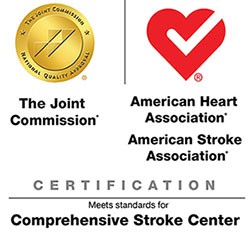
Mercy Hospital Oklahoma City Stroke Center
- Home
- Locations
- Mercy Hospital Oklahoma City
- Mercy Hospital Oklahoma City Stroke Center
Comprehensive Stroke Center in Oklahoma City
Every minute matters when it comes to stroke. Mercy Hospital Oklahoma City provides 24/7 access to life-saving neurological care, with the expertise and technological resources to quickly diagnose and treat any stroke within one hour of arrival. Our hospital is one of fewer than 200 Joint Commission Certified Comprehensive Stroke Centers out of more than 5,000 hospitals in the United States. Mercy Hospital Oklahoma City is one of two hospitals in the Mercy system to achieve this certification.
Faster Stroke Care. Better Outcomes.
Mercy Hospital Oklahoma City leads the nation in providing the right stroke care at the right time. Our advanced care is nationally recognized. Our results are lifechanging.
Mercy Hospital Oklahoma City Stroke Center's Commitment to Quality Care
Mercy Hospital Oklahoma City is a leader in the health care industry in providing the proper stroke care at the right time. Our advanced stroke care is nationally recognized. We have dedicated monitoring and reporting systems to ensure our patients’ well-being and comfort are always top of mind. Quick stats to know:
- 8 minutes faster door-to-needle time than any other hospital in the state of Oklahoma
- 16 million brain cells saved per patient
- 10.5 minutes speedier time to treatment than comparable comprehensive stroke centers
- 22 million brain cells saved per patient
The Role of Comprehensive Stroke Centers in Stroke Care
Mercy Hospital Oklahoma City has earned The Joint Commission's Gold Seal of Approval®, the most demanding stroke certification offered by The Joint Commission, and the American Stroke Association's Heart-Check Mark for Comprehensive Stroke Center Certification.
The Joint Commission standards are developed in consultation with health care experts and providers, measurement experts, and patients. To achieve this designation, Joint Commission reviewers evaluate compliance with related certification standards, including:
- 24/7 availability of an acute stroke team and neurosurgical services
- Dedicated neuro intensive care unit beds for complex stroke patients
- Comprehensive diagnostic services
- Experience providing the most complex stroke treatments
- 24/7 ability to meet the needs of two complex stroke patients at the same time
Understanding Strokes
According to the CDC, someone in the United States has a stroke every 40 seconds. Stroke also reduces mobility in more than half of all stroke survivors age 65 and older.
A stroke occurs when a clot or bursts block a blood vessel carrying oxygen to the brain. When that happens, part of the brain can’t get the oxygen it needs, and brain cells die. A stroke can be devastating and deadly if untreated or treated too late. Strokes can be classified into two main categories: ischemic and hemorrhagic.
Ischemic strokes are by far the most common type of stroke and occur when a blood vessel that carries blood to the brain becomes blocked, preventing blood flow. There are two types of ischemic stroke:
- Thrombotic – occurs when the blood vessels within the brain become clotted
- Embolic – caused when a blood clot of plaque debris forms elsewhere in the body and then travels to the blood vessels in the brain through the bloodstream
Hemorrhagic strokes are less common and occur when a blood vessel that carries blood to the brain ruptures. When brain cells and tissues don’t get the oxygen and nutrients required to function, pressure can build in surrounding areas. This can cause irritation or swelling, which can lead to brain damage. There are two types of hemorrhagic stroke:
- Intracerebral – describes bleeding from blood vessels directly within the brain
- Subarachnoid – occurs in the subarachnoid space, which is the space between the brain and its membranes
Knowing your risk factors and making healthy lifestyle decisions can significantly decrease your risk of stroke throughout your lifetime.
Stroke Services Offered at Mercy Oklahoma City
Research shows that patients who get care at a comprehensive stroke center, such as Mercy Hospital Oklahoma City, have a higher incidence of survival and recovery. We provide expert, life-saving stroke prevention, treatment, and rehabilitation with a full range of services.
Each year, nearly 800,000 people suffer a stroke, making it the fifth leading cause of death in the U.S. and a leading cause of long-term, chronic disability. However, 80% of strokes are preventable, and there are many risk factors for stroke that you can control, such as avoiding cigarettes and eating heart-healthy foods.
Our comprehensive stroke prevention program at Mercy Hospital Oklahoma City includes access to Mercy specialists and dietitians who can help you lower your risk of stroke by making critical lifestyle adjustments. We also perform stroke risk assessments, conduct blood pressure screenings and aid with cholesterol monitoring and/or diabetes management for patients, as needed.
For many patients, immediate treatment can help prevent death or long-term consequences, including loss of vision, speech, and motion. Effective stroke treatment options include:
- IV thrombolytic administration (Tenecteplase)
- Intra-arterial thrombolytics (IA)
- Special procedures to remove or break up a clot, such as mechanical thrombectomy
- Surgical or endovascular aneurysm repair
- Carotid artery procedures and surgeries to ensure optimal circulation to the brain
We also offer patients access to cutting-edge technology and equipment used for stroke treatment. One such technology is biplane imaging, which produces three-dimensional images of the vascular system, bones and soft tissue. Its precise brain imaging helps the neuro interventional radiologist and technician navigate through arteries to remove a clot or treat a blockage.
Early action is critical when a patient suffers a stroke, and inpatient rehabilitation can play an essential role in recovery. After a stroke, rehab should begin as soon as possible once a patient’s medical condition has stabilized and doctors have taken preventive measures against further strokes and complications. Research has shown that inpatient rehab results in shorter lengths of stay and a lower risk of hospital readmission.
Physical, occupational and speech therapists also aid in the stroke rehabilitation process. Plus, our nurses are specially trained in caring for patients with brain injuries.
Our interdisciplinary team of clinicians works with them individually to help patients regain the most function possible after a stroke, designing and implementing a treatment plan to maximize potential outcomes.
After a stroke, patients often report experiencing unsettling changes to their overall mood and outlook. Having the proper emotional and psychological support can help patients recover faster mentally from a stroke.
At Mercy Hospital Oklahoma City, we offer support groups and counseling services for stroke patients and their families. Forming long-lasting connections with others and receiving the proper follow-up care can help patients with the long-term management of their condition and improve their quality of life.
Mercy’s stroke team provides 24/7 emergency care. Our team of highly skilled and experienced medical professionals includes specialized nurses, stroke neurologists, neurosurgeons and pharmacists credentialed in treating acute stroke.
We also have a team of committed interventional radiologists and vascular surgeons working to care for patients. Plus, our rehabilitation specialists and therapists aid patients throughout the recovery process.
Stroke patients may require specialized care during their recovery. Mercy stroke nurses have advanced training and expertise in caring for patients with brain injuries. Mercy Rehabilitation Hospital Oklahoma City provides inpatient rehab services for stroke patients with dedicated brain injury and stroke care units.

